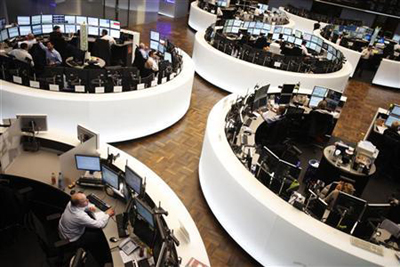Wednesday, 16 September 2015 03:14
 LONDON: European stocks climbed Tuesday as downbeat US data on the eve of a Federal Reserve meeting was seen by investors as dimming the likelihood of an interest rate hike.
LONDON: European stocks climbed Tuesday as downbeat US data on the eve of a Federal Reserve meeting was seen by investors as dimming the likelihood of an interest rate hike.
Speculation is divided over whether the Federal Reserve’s monetary policy committee, which meets Wednesday and Thursday, will deem the US economy strong enough to withstand the first rate hike since 2006.
The policymakers’ decision has been further complicated by concerns about Chinese growth and other weaknesses across the global economy.
London’s benchmark FTSE 100 index rose 0.87 percent to close at 6,137.60 points, putting aside official data showing British inflation fell back to zero in August.
In the eurozone, Frankfurt’s DAX 30 added 0.56 percent compared with Monday’s close to 10,188.13 points and the CAC 40 in Paris climbed 1.13 percent to 4,569.37.
Milan jumped 1.62 percent and Madrid gained 0.89 percent.
In foreign exchange activity, the euro slid to $ 1.1267 from $ 1.1317 late on Monday in New York.
Wall Street was also higher as investors took worse-than-expected US retail sales and industrial production data as a signal that the Federal Reserve may put off raising interest rates for a few more months.
In midday trade the Dow Jones Industrial Average was showing a gain of 0.95 percent to 16,526.52 points.
The broad-based S&P 500 climbed 0.78 percent to 1,968.28, while the tech-rich Nasdaq Composite Index gained 0.68 percent to 4,838.30.
US retail sales rose 0.2 percent in August, boosted by robust auto sales, but slightly below analysts’ consensus estimate.
Industrial output fell by 0.4 percent in August from the previous month, more than the 0.2 percent drop expected by analysts.
The indicators were among few remaining US data points ahead of the keenly awaited Federal Open Market Committee (FOMC) decision.
Rob Carnell at ING Bank said the weak data “nudges the argument in the direction of the FOMC doves” who want to wait a bit longer to raise rates.
With only consumer price inflation left to come out, and with expectations that will also be on the low side, “the data dependent FOMC might find the pendulum swinging a little more to the ‘no hike’ side”, added Carnell.
In Europe, investor sentiment has slumped in Germany this month over concerns that sharply slowing growth in emerging markets will hurt the vital export sector of the eurozone’s top economy, a leading survey said Tuesday.
The widely watched investor confidence index calculated by the ZEW economic institute sank 12.9 points from August to stand at just 12.1 points — a level not seen for almost a year and far short of analysts’ expectations.
“September’s ZEW survey confirmed that recent market turmoil and concerns over the global environment have had an adverse impact on German investor confidence,” said Jonathan Loynes, chief European economist at research group Capital Economics.
Analysts were quick to point out, however, that the German economic engine was in good shape overall and that weakness in demand from China could increasingly be compensated by growth in Europe and the United States.
In Asia trading on Tuesday, Tokyo won 0.34 percent, closing higher for the first time in four sessions after the Bank of Japan refrained from unleashing fresh monetary stimulus amid unease over much of the world economy.
Despite Tokyo’s bounce, lingering concerns about the state of China’s economy dragged down shares in Shanghai and Hong Kong.
The car manufacturing sector was meanwhile in focus on the corporate front with the IAA auto show on in Frankfurt and as US giant Ford said it has no concrete time schedule for when it aims to return to profit in Europe.
At the IAA show, BMW chief executive Harald Krueger, 49, fainted during a press briefing. He was feeling better but cancelled all appointments for the rest of the day, a company spokesman said.
BMW shares nevertheless revved up 2.2 percent at 87.23 euros.
Shares in French energy company EDF fell 3.6 percent to 16.95 after it acknowledged that the nuclear reactor at Hinkley Point in Britain would undoubtedly come on line later than in 2023 as originally foreseen.
At the beginning of this month it was forced to push back the launch of its first next generation EPR reactor, at Flamanville in northwestern France, to the end of 2018 following fresh problems at the site.




























